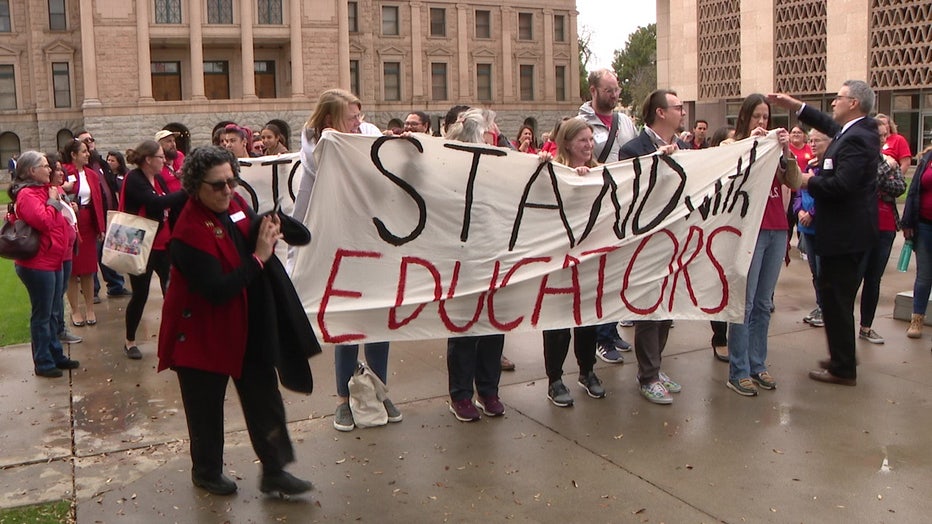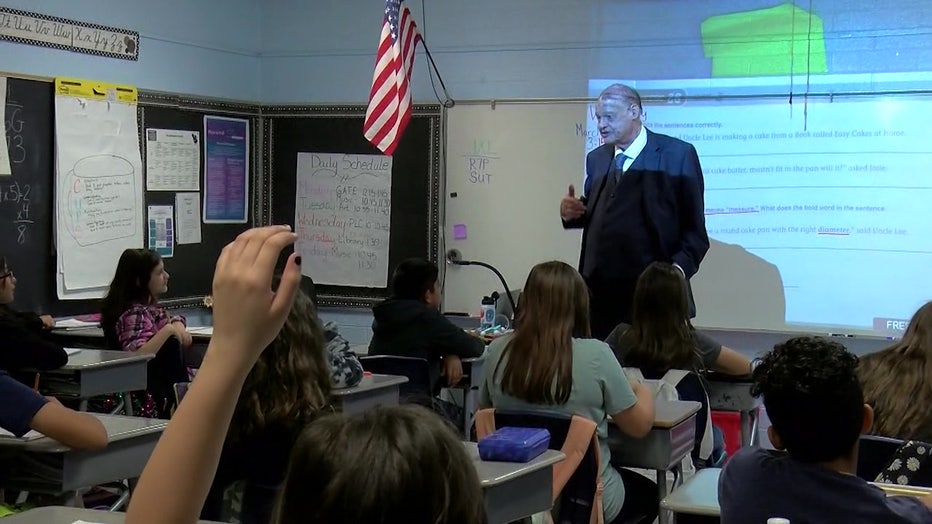Some Arizona teachers take part in protest against teacher complaint hotline: Here's what you should know
Arizona teachers denounce state government hotline for people to report instructors
There is ongoing controversy surrounding a hot line that was launched as a tool for Arizona parents to report issues in classrooms to the state's Department of Education, with a group of educators voicing their concerns in a protest on Mar. 15. FOX 10's Linda Williams reports.
PHOENIX - Months after taking office, an action by Arizona's new Superintendent of Public Instruction has stirred some degree of controversy amongst educators.
On Mar. 9, the state's Department of Education announced the creation of an "Empower Hotline," and encourages people to report on school lessons that "detract from teaching academic standards."
"I promised to establish this hotline so that anyone could report the teaching of inappropriate lessons that rob students of precious minutes of instruction time in core academic subjects such as reading, math, science, history and the arts. That promise is being kept," Superintendent of Public Instruction Tom Horne wrote, in the statement.
Here's what you should know about the hotline.
What is the hotline meant for?
According to the Arizona Department of Education's statement, the Empower Hotline allows people to report on inappropriate public school lessons, like those that focus on race or ethnicity, promote "gender ideology," "social emotional learning," or inappropriate sexual content.
"The hotline provides the opportunity for constituents to provide feedback, concerns or complaints, which is a standard service offered by multiple government agencies and private-sector businesses," read a portion of the statement.
According to Supt. Horne, since the hotline's launch, they have received over 200 calls, as well as over 500 e-mails.
"I think parents need to have legitimate avenues to complain about what's happening with the education of their children. Their children are the most important thing to them," said Supt. Horne.
Why was the hotline established?
As mentioned above, Horne said he had promised to establish the hotline.
"I believe we are all individuals, brothers and sisters under the skin, entitled to be judged by what we know, what we can do, our character, and ability to appreciate beauty," Horne said, in the statement.
In the statement, Horne specifically mentioned Critical Race Theory.
"Race is irrelevant to anything. Critical race theory teaches the opposite, that race is primary. They divide students into ‘oppressors’ and ‘oppressed’ based on what race they were born into, which is irrational," Horne wrote.
What is Critical Race Theory?
According to the Associated Press, Critical Race Theory (CRT) is a way of thinking about America’s history through the lens of racism.
Scholars developed it during the 1970s and 1980s in response to what they viewed as a lack of racial progress following the civil rights legislation of the 1960s. It centers on the idea that racism is systemic in the nation’s institutions and that they function to maintain the dominance of white people in society.
The architects of the theory argue that the United States was founded on the theft of land and labor and that federal law has preserved the unequal treatment of people on the basis of race. Proponents also believe race is culturally invented, not biological.
Kimberlé Crenshaw, executive director of the African American Policy Forum, a social justice think tank based in New York City, was one of the early proponents. Initially, she says, it was "simply about telling a more complete story of who we are."
Many Republicans view the concepts underlying critical race theory as an effort to rewrite American history and persuade white people that they are inherently racist and should feel guilty because of their advantages.
But the theory also has become somewhat of a catchall phrase to describe racial concepts some conservatives find objectionable, such as white privilege, systemic inequality and inherent bias.
Is CRT taught in schools?
Depending on who you ask, the answer is different.
The Associated Press has previously reported that CRT is not taught in state schools.
"There is little to no evidence that critical race theory itself is being taught to K-12 public school students, though some ideas central to it, such as lingering consequences of slavery, have been," read a portion of an AP article published in 2021.
However, the same article also states that some parents, in various parts of the country, have viewed some school-related activities or materials as part of CRT, such as some middle schoolers in Connecticut being given a "White Bias" survey, or teachers in one public school system in North Carolina taking part in a professional development session on CRT.
In Arizona, Governor Katie Hobbs said CRT is not being taught in schools.
"We don't teach CRT in Arizona. The bill sponsor himself couldn’t cite any specific examples of this actually happening," Gov. Hobbs said, referring to the sponsor of a bill she vetoed that would ban CRT in state schools.
Officials with the Arizona Department of Education, meanwhile, maintain that CRT is being taught in school, and that any claims it is not being taught is "false."
"Critical Race Theory (CRT) is being taught in many public schools. It’s not a myth, and it’s not just a college-level curriculum. It’s an ideology that can wear many different labels," read a portion of the Arizona Department of Education's website. "Because many CRT supporters recognize the CRT label carries negative connotations, efforts are made to use other terms or no terms at all. That leaves enough room to deny that something labeled CRT is taught."
In addition, the Arizona Department of Education also denounces Social Emotional Learning (SEL) as a "trojan horse" to introduce elements of CRT into schools.
What is SEL?
According to the website of National University, an accredited private university headquartered in San Diego, Calif., Social Emotional Learning is "a methodology that helps students of all ages to better comprehend their emotions, to feel those emotions fully, and demonstrate empathy for others."
"These learned behaviors are then used to help students make positive, responsible decisions; create frameworks to achieve their goals, and build positive relationships with others," read a portion of NU's website.
NU's website states that SEL is not a designated subject, like history or math. However, the website states it can be woven into the fabric of a school's curriculum.
"When educators make academic lessons more personal and relatable to students, students may be more inclined to participate and may be less likely to mentally check out during their subjects. By fostering a sense of empathy, self-awareness, and feelings of safety and inclusiveness in the classroom, SEL can have a positive impact that lasts a lifetime," the website states.
NU's website on SEL makes no mention of race, ethnicity, or sexual orientation in relation to SEL.
Wasn't there a bill that bans teaching CRT in Arizona? What happened to it?
As mentioned earlier, a bill that would have banned CRT, as well as instruction that "promotes or advocates for any form of blame or judgment on the basis of race, ethnicity or sex," was vetoed by Gov. Hobbs.
In a short letter sent to legislators, Gov. Hobbs wrote that it is "time to stop pushing students and teachers into culture wars rooted in fear mongering and evidence-free accusation."
Back to the hotline: Have there been similar hotlines established elsewhere?
Yes.
According to the AP, Virginia’s governor started a similar call line for CRT reports, but shut it down when parents used it primarily to report special education violations and praise teachers.
What are critics saying about Arizona's Empower Hotline?

A protest over the Empower Hotline in Arizona
Critics say the hotline is a waste of limited educational resources, and will only heighten the political tensions that have pushed teachers out of the classroom.
On Mar. 15, dozens of teachers took part in a protest against the Empower Hotline.
"Superintendent Horne has been negative, disrespectful, calling out teachers, creating more of a division between students parents and their teachers. Remind him this is not helping any of our problems," said one person at the protest.
Official with the Arizona Education Association says parents have many avenues to reach teachers, but that the hotline feels like teacher harassment.
"We have such great relationships with parents. There isn't this huge majority of parents who are struggling with communicating with teachers. It's a small minority that has decided this was going to be a political issue, and it's enough for them," said Marisol Garcia with the Arizona Education Association.
What has Supt. Horne said in response to the critics?

Arizona Superintendent of Public Instruction Tom Horne
Supt. Horne was in Tucson on Mar. 15. For his part, he said he is aware that the hotline is not popular with some Arizona teachers.
However, Supt. Horne also appeared to criticize teachers who took part in the protest.
"I served 24 years on a school board, and our rule was anybody could come in and watch the teaching, and the teachers never complained because they were proud of what they were doing, so those who are protesting, maybe they are not so proud of what they're doing," said Supt. Horne, in an audio interview.

